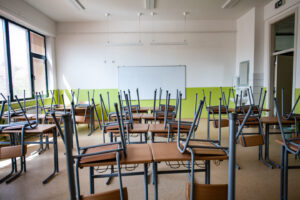Op-Ed: Let every Washington student have school choice like I did
(The Center Square) – When Washington Governor Jay Inslee released a proclamation recognizing National School Choice Week, I was optimistic for the future of K-12 education in my home…

(The Center Square) – When Washington Governor Jay Inslee released a proclamation recognizing National School Choice Week, I was optimistic for the future of K-12 education in my home state.
Growing up in Vancouver, my younger sister and I were privileged to exercise school choice when we received scholarships to attend a small private school. We had a terrific school experience. Our education helped shape us into the people we are today and provided us with plenty of opportunities, including a better chance to graduate from college, which I’ll do in May, and my sister will do at the same time next year.
We were lucky. Without the scholarship, there was no way we would have been able to afford a private school education. Sadly, that’s the case for many Washington families.
But it doesn’t have to be this way. There can and should be more options for families who cannot afford private education in Washington. This past legislative session, Representative Vicki Kraft, R-Vancouver, and others put forth House Bill 2042 to try and make a difference in the number of education options available to lower-income families.
Although the bill made no headway out of Committee, Kraft took the time to explain the bill’s purpose to me in an interview.
“There is a need for kids to be able to have a learning and schooling environment that works for them,” she said. She went on to say that if this bill were passed, it would’ve “put students first, quality education first, and parents desire’s first” by opening up “the choices for parents and students to private and homeschool.”
And looking at the bill’s contents, Kraft is right. HB 2042 would have specifically helped families who cannot afford education expenses, like private school tuition, private tutoring, and books, by providing a $7000 scholarship to 130,000 students in Washington state. Moreover, twenty-five percent of the funds in the bill would have been set aside for special populations, including foster care, homeless and low-income children, and children receiving special education services.
At present, Washington State’s education system affords low-income students fewer education opportunities than their more affluent peers. Granted, Washington does have Running Start — which allows 11th and 12th-grade students to take college courses at Washington’s 34 community and technical colleges for dual credit — but that is not enough.
Students should have the opportunity to change their educational environment earlier than their last two years of primary school. Passing school choice legislation similar to HB 2042 in the next legislative session can provide the expanded educational opportunity so many students and families are looking to have by opening access to students in every grade.
In addition to making Washington’s education system more equitable, bills like HB 2042 would likely improve educational outcomes for both public and private school students. In fact, 25 of the 27 studies done on public school students’ test scores and 11 of the 17 studies done on school choice program participants’ test scores find positive effects.
Studies on parent satisfaction go up too, as 28 of the 30 studies find positive results. The positive parent satisfaction can partially be attributed to the aforementioned higher test scores but can also be attributed to how school choice empowers parents to embed the moral, civic, and cultural values they want in their child’s education.
School choice policies can change kids’ lives across the country. This was the case for my sister and me, but we were the outliers in Washington state, not the norm.
State legislators in Washington can fix this by passing school choice legislation in the next legislative session, creating a world of educational opportunities for thousands of Washingtonian children who needed it like my family did.



